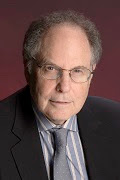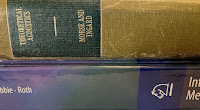 |
| An episode of Meeting of Minds, with (l-r) Atilla the Hun, Emily Dickinson, host Steve Allen, Charles Darwin, and Galileo Galilei. |
When I was a teenager, one of my favorite shows was Meeting of Minds. This television series, which aired on PBS from 1977 to 1981, featured historical figures interacting in a talk-show format. The host was the delightful comedian, musician, and television personality Steve Allen.
The episode containing the most science—and therefore most closely related to Intermediate Physics for Medicine and Biology—had as guests Charles Darwin, Galileo Galilei, Emily Dickinson, and Attila the Hun. You can watch this episode at the website for the American Archive of Public Broadcasting. I highly recommend it.
Below is an excerpt from when Darwin was discussing his voyage on the Beagle (in the video, this section starts at about 23:15).
Dickinson: How old were you when you made the trip?This discussion took place when Darwin was discussing the controversy caused by his theory of evolution by natural selection (26:15)
Darwin: I was only 22. We set out from Plymouth on December the 27th, 1831.
Allen: A long or short voyage?
Darwin: Oh, it was five long years before I returned to England. It seems to me now that those five years constituted my real education.
Dickinson: Dr. Darwin, we know that your theories got you into the most dreadful trouble, that you were violently criticized, as was Signore Galilei. But what I cannot understand is how such common sense reasoning could have gotten you into such incredible difficulty.I think the writers gave Galileo the best lines, like when Darwin and Galileo were discussing the dogmatism of Aristotle (38:45).
Darwin: Oh my dear woman, the real trouble didn’t come about until after I presented to the world the idea that the common ancestry of all living things included man.
Galileo: Oh, how they must have howled for your blood when you said that!
Darwin: It’s by no means a simple question as to what extent one should respect intellectual authority.Finally, a great soliloquy by Galileo about reason versus faith (45:50).
Galileo: There you are quite right. We must pay the most careful attention to what the great minds of earlier ages have discovered… But, we must never let our admiration for these great men blind us to the fact that they were only human, for their humanity means that they will inevitably fall into error at certain times.
Galileo: There may be doubts and arguments as to the passages of scripture, problems of translation, et cetera. But there should be no room for doubt or argument about the evident facts of the physical world about us. Nature, unlike the sometimes confusingly worded scriptures, is inexorable and immutable, and does not care one jot whether her reasons and modes of operation are above or below the capacity of man’s understanding.
I like it best when the guests argue with each other (Dickinson gets so exasperated with Attila). For those of you whose interest is not science, you might enjoy listening to Dickinson read some of her poems or hear Atilla tell old war stories.
If I were Steven Allen and had to choose four guests to discuss physics in medicine and biology, who would I select? It’s tough to narrow it down to just four, but I would invite Marie Curie, Willem Einthoven, Alan Hodgkin, and Paul Lauterbur. Wouldn’t that be a fascinating discussion! Curie could tell us how she and her husband Pierre analyzed and purified tons of ore to isolate two new elements: radium and polonium. She could also recount her experience using medical x-rays during World War I. Einthoven could describe how he recorded the first electrocardiogram, and how he balanced his education in medicine with his interest in physics. Hodgkin could explain his research with Andrew Huxley that determined how nerves work. And Lauterbur could reflect on his invention of magnetic resonance imaging. Perhaps Curie might ask Lauterbur about who really invented MRI, him or Raymond Damadian. And Einthoven might probe into who deserves the credit for the voltage clamp, Hodgkin or Kenneth Cole. And they all could compare their experiences receiving the Nobel Prize (I can just hear Curie saying “but gentlemen, how many of you have two?”) What fun.
I could not find the Meeting of Minds episode with Darwin and Galileo on YouTube, so I couldn’t embed the link. I did find another episode on YouTube, featuring Teddy Roosevelt, Cleopatra, Thomas Paine, and Thomas Aquinas. It’ll give you a flavor of what the show is like.


















